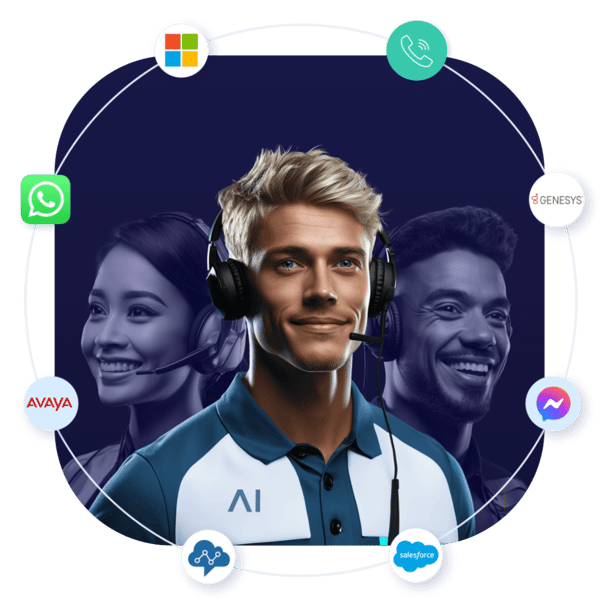Salesforce, Cognigy, Github: Numerous companies are announcing a new generation of AI assistants. The so-called agents take over tasks that were previously done by employees.
Düsseldorf, Frankfurt, San Francisco. It beeps five times, then a voice answers the line: "Hello, this is Sophia, Martin Giesswein's AI assistant. How can I help you?" Sophia takes the reporter's request, summarizes everything again, and says goodbye in a friendly manner: "I'll tell Martin everything. Have a nice day."
The conversation between the real caller and the artificial agent lasts a minute and maybe the beginning of a revolution. AI agents like Sophia have the potential to fundamentally change office jobs and communication.
Until now, voice robots or bots could only answer frequently asked questions for which a company had already provided answers - for example, about office hours. The new generation of AI assistants, often referred to as "agents", can act much more flexibly thanks to advances in artificial intelligence (AI). Agent Sophia, for example, has access to Martin Giesswein's calendar and is able to arrange an appointment directly.
Giesswein is what is known in the scene as an "early adopter": The author and lecturer is a one-man company that tries to automate as many tasks as possible. So that Sophia can receive and answer calls, he has left a short instruction with the Viennese start-up Fonio. It says: "Your role is Martin Giesswein's AI assistant. Your goal is to find out what the customer's concerns are and how you can help." When asked about his lecture offer, she is also supposed to provide information about the topics he can give speeches on.
Telephone agents like Sophia are one of dozens of variants of AI agents that are currently coming onto the market and have the potential to completely transform not only the work of freelancers but also the processes in large companies.
AI agents are the tech trend of 2025
The software company Salesforce AI agents for sales and marketing have been developed. The agents of the German start-up Celonis can automatically optimize processes, and the agents of the AI company Anthropic can perform tasks on the user's computer. And, as the news service Bloomberg reported on Wednesday, the AI pioneer OpenAI is also expected to introduce its agents in January.
"The Gordian knot of productivity has finally been solved." - Alexander Wallner, Germany head of Salesforce
According to analysis firm GartnerAI agents are the most important technology trend in 2025. Analysts expect that by 2028, 15 percent of daily work decisions will be made autonomously by AI agents. Salesforce Germany boss Alexander Wallner predicts that agents could increase the added value for his customers by almost 40 percent. He says: "The Gordian knot of productivity has finally been solved."
Handelsblatt spoke to managers and developers and identified practical examples that show why AI agents could provide the productivity boost hoped for from AI and where they will be used first.
What makes AI agents so special? Example Cognigy
"We are now experiencing a revolutionary time," says Philipp Heltewig. The CEO of the AI company Cognigy is sitting in his office in Düsseldorf at the Media Harbor. Using a projector, he demonstrates how his customers can create AI agents themselves.
Since 2016, he and his co-founders Benjamin Mayr and Sascha Poggemann have been developing AI solutions for customer service for companies such as Lufthansa, Eon, and Allianz. The latest advances in artificial intelligence are opening up completely new application possibilities.

The founding team of Cognigy: Benjamin Mayr, Philipp Heltewig, Sascha Poggemann (from left)
"The agents will completely change how we use AI in the future," Heltewig is convinced. "In the past, AI's ability was limited to following commands." Today, the agent is only given the knowledge and various tools, and the AI agent then decides independently how to solve the customer's problem.
They also have an advantage over employees: the number of virtual agents can be increased at will and a low cost. As with real employees, it makes sense to use different specialists who monitor each other.
Heltewig first builds the customer service agent Lisa for an airline in his demonstration. He instructs the AI to be helpful and friendly with customers. He uploads files such as flight schedules and information that she should access when needed. He then links the agent to all the software programs she needs to carry out her tasks.

Cognigy Agents: Customers can create their own AI Agents.
Lisa can now change passenger data independently, respond to complaints by email, and provide information about delays - in any language. She asks her virtual colleagues for other special tasks: If there are questions about invoices, she communicates with agent Jacob, who specializes in billing. If it is about rebookings, she consults agent Naomi. Cognigy's goal is to solve as many customer problems as possible without the need for staff.
People should only be consulted when the AI agents reach their limits. This is the case, for example, when it comes to refunds. In Germany, these have to be carried out by people for legal reasons.

AI agents: The agents have their own “personas” and are specialized in certain tasks.
The company Cognigy wants to set itself apart from other providers by offering a wide range of options: Like a construction kit, AI providers, interfaces to programs, links to real-time information, and filters can be selected. One example is a filter that prevents sensitive customer data such as credit card numbers from being processed and stored by the AI.
Example Salesforce: Brenntag uses AI agents to manage orders
AI agents have great potential not only in direct customer contact but also as support for employees. The chemicals retailer Brenntag is testing currently employs Salesforce agents to respond to customer inquiries and orders more quickly and professionally. For example, in emails, they create summaries of previous customer interactions and help research product information.
Brenntag's Chief Technology Officer Michelle Wu says: "The chemical industry is very fragmented and complex." Various AI agents support sales and customer service employees with reliable specialist knowledge. "This increases the response time and quality of our answers to our customers, who expect accuracy and in-depth knowledge from Brenntag ."
From 2025, Brenntag plans to use Salesforce agents in regular operations. The manager hopes that this will enable the company to save up to a quarter of the processing time per request.
For Salesforce, the development of agents is the "most important innovation" of all time. In an interview with Handelsblatt, Germany boss Wallner spoke of a "technology of the century": "Our agents can even decide for themselves when they need to create additional agents to solve tasks." Salesforce agents are currently used in 15 industries.
Example Github: AI agents program computer games
One industry that agent providers have high hopes for is the software industry. Github boss Thomas Dohmke showed what his agents are capable of at the annual conference of his programming platform in San Francisco. On stage, he programmed a new video game with the GitHub copilot by simply describing to the agent in simple terms what it should look like and what the rules of the game are.
According to Dohmke, this is just the beginning. He told Handelsblatt that agents can already write an entire program code today. This makes AI a kind of Lego brick of the IT world, with which even completely inexperienced users can build new products, apps, or websites.
Existing program codes could also be improved in this way. New employees at a company could get started more quickly and gain an overview of the existing code base.
According to Dohmke, however, humans will still be needed in the future: they can improve their work – for example, by having a brainstorming agent who can help with creative tasks.
Example LinkedIn: AI agents search for staff
The career network LinkedIn has released a recruiting agent that supports recruiters, headhunters, and HR departments. The AI agent suggests suitable candidates for a job advertisement. If the recruiter decides to start a conversation with the candidate, the assistant takes over the appointment scheduling. He is also available to answer follow-up questions.
Organization director Daniel Shapero says: "AI agents can solve entire task chains if this has been approved by the person in charge." However, it is important that "people are in control." An agent can, for example, plan a meeting independently, so has "a certain amount of freedom of decision." But: "The evaluation of a candidate, the decision as to who moves forward, is the responsibility of the recruiter." "People are in control." - Daniel Shapero, organizational board of the professional network LinkedIn
The tech giant Amazon, for example, had bad experiences here: an AI for candidate selection had eliminated non-male and non-white candidates. According to Shapero, this can no longer happen with the new agents. LinkedIn is working hard to ensure that the agents do not adopt human prejudices, for example. This has been successful: "We have found that by using AI agents we get a more balanced pool of applicants."
A well-known phenomenon is that women often do not consider themselves suitable for a position, even though they meet all the requirements. This is where the AI agent can help: It checks the CV and qualifications in advance and can then point out to applicants that they basically meet all the necessary requirements. Shapero says: "We have found that more women apply for positions when the agent gives them feedback that they are qualified."
Due to the range in which AI agents are already being used today, Cognigy CEO Heltewig is convinced: "Soon it will no longer be possible to imagine what working was like without AI agents."
If you would like to know more about Cognigy's Agentic AI you can watch the launch webinar on-demand now - here




.png?width=60&height=60&name=AI%20Copilot%20logo%20(mega%20menu).png)



